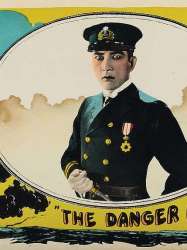Film Booking Offices of America

If you like this company, let us know!
Film Booking Offices of America (FBO) (also known as FBO Pictures Corporation) was an American film studio of the silent era, a producer and distributor of mostly low-budget films that were sometimes well-made. The business began in 1918 as Robertson-Cole (U.S.), the American division of a British import–export company and Robertson-Cole was formed by the English-born Harry F. Robertson and the American Rufus Sidman Cole. Robertson-Cole bought the Hallmark Exchanges (formerly the Mutual Exchanges that became known as Exhibitors-Mutual Exchanges) from Frank J. Hall in 1920. Exhibitors-Mutual/Hallmark had distributed Robertson-Cole product, and acquiring the exchanges gave them the right to distribute their own films plus Hall's product, with the exception of Charlie Chaplin reissues he had the rights to.
Robertson-Cole initiated movie production in the United States in 1920. That year, it incorporated Robertson-Cole Studios, Inc. and bought 460 acres in Santa Monica, California to establish a studio. The property, which became known as the "R.C. Ranch", enabled Robertson-Cole to centralize movie production, which previously had been scattered. The movie company had relied on equipment rentals to produce motion pictures. Two years later, a corporate reorganization led to the company's new name, with FBO becoming the official name of the distributing operation and Robertson-Cole Pictures Corp. the name of the production operation. In 1923, the studio contracted with Western actor Fred Thomson, who would soon emerge as one of Hollywood's most popular stars. Thomson was just one of numerous screen cowboys with whom FBO became identified.
The studio, whose core market was America's small towns, also put out many romantic melodramas, non-Western action pictures, and comedic shorts. In 1926, financier Joseph P. Kennedy led a group that acquired the company. In June 1928, using RCA Photophone technology, FBO became only the second Hollywood studio to release a feature-length "talkie." A few months later, Kennedy and RCA chief David Sarnoff arranged the merger that created RKO, one of the major studios of Hollywood's Golden Age.
Best films
Filmography of Film Booking Offices of America (125 films)
Production
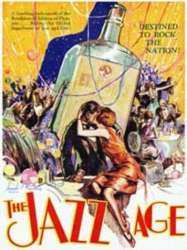
The Jazz Age (1929)
, 1h4Origin USA
Actors Douglas Fairbanks, Jr., Marceline Day, Henry B. Walthall, Joel McCrea, Myrtle Stedman, Gertrude Dolores Messinger
Steve Maxwell (Fairbanks) and Sue Randall (Day), during an escapade, wreck one of her father's streetcars. Randall uses this incident to stop the elder Maxwell (Walthall) from opposing his illegal contract with the city. When Steve tells all to the city council, Mr. Randall (Ratcliffe) threatens Steve with arrest, Sue admits her culpability, and announces her intentions of marrying Steve.

Love In The Desert (1929)
Directed by George Melford
Origin USA
Genres Action, Adventure, Romance
Actors Olive Borden, Hugh Trevor, Noah Beery Sr., Frank Leigh, Ida Darling, Alan Roscoe

Gang War (1928)
, 1h10Directed by Bert Glennon
Origin USA
Genres Drama, Crime
Themes Gangster films
Actors Jack Pickford, Olive Borden, Mabel Albertson, Eddie Gribbon, Walter Long
The film follows the saxophone player Clyde, who busks on the San Francisco Bay waterfront. One night, he meets Flowers, and teaches her to dance, but finds that "Blackjack" (Eddie Gribbon), the leader of a ruthless gang, is also in love with her. Despite the intense turf war between "Blackjack" and a rival gangster named Mike Luego (Walter Long), "Blackjack" wins the heart of Flowers and marries her, but without consummating the marriage. Clyde is eventually able to win "Blackjack" over however, and "Blackjack" sacrifices himself to protect Clyde and Flowers from Luego. Gang War was produced in black and white on Academy ratio 35 mm film, and was originally to be a silent film. However, a spoken prologue was added, in which a group of reporters (including one played by Mabel Albertson) discuss the events that are to come.
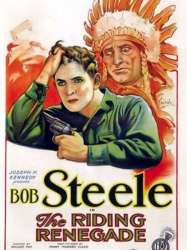
The Riding Renegade (1928)
Directed by Wallace Fox
Origin USA
Genres Western
Actors Bob Steele, Lafe McKee, Ethan Allen Laidlaw, Mary Carr
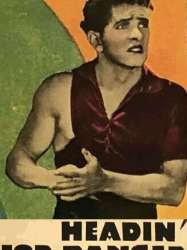
Headin' for Danger (1928)
Directed by Robert N. Bradbury
Origin USA
Genres Western
Actors Bob Steele, Al Ferguson, Frank Rice

Secret Orders (1926)
, 1hDirected by Chester Withey
Origin USA
Genres Drama
Actors Harold Goodwin, Robert Frazer, Evelyn Brent, John Hough, Brandon Hurst, Marjorie Bonner
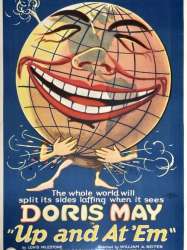
Up and at 'Em (1922)
, 50minutesDirected by William A. Seiter
Origin USA
Genres Comedy, Comedy-drama, Romance
Actors Hallam Cooley, J. Herbert Frank, Doris May, Otis Harlan, Clarissa Selwynne, Harry Carter
Wishing to drive her father's car, Barbara Jackson (Doris May) dresses up in the chauffeur's uniform and sneaks out. For a lark, she picks up a passenger (John Gough), but it develops that passenger is part of a team of crooks who are planning to rob Bob Everett (Hallam Cooley), a rival of her father, of his precious artworks. Believing her to be an undercover detective, the bandit forces her to take part in the robbery and then abandons her to be caught by Everett. After convincing Everett that she was a forced accomplice and not the real thief, the two hurry to meet up with Barbara's father, William Jackson (Otis Harlan). He had just purchased one of the paintings from an art dealer (Harry Carter), and the dealer had left moments before Barbara and Everett arrive. As the two explain the deception, William informs him that he became suspicious when recognizing the painting as one owned by Everett and that he had the dealer held at the front gate. The police arrive and round up the crooks.

The Leather Pushers (1922)
Directed by Harry A. Pollard, Malcolm St. Clair, Edward Laemmle
Origin USA
Genres Drama
Actors Reginald Denny, Edgar Kennedy, Norma Shearer

The Mistress of Shenstone (1921)
Directed by Henry King
Origin USA
Genres Drama, Comedy-drama, Romance
Actors Pauline Frederick, Roy Stewart, Roy Stewart, Emmett King, Lydia Yeamans Titus
Lady Ingleby, dont le mari est au front, reçoit la nouvelle de la mort de celui-ci, ce décès étant la conséquence d'un accident perpétré par l'un de ses compagnons d'armes. Elle se retire alors sur la côte de Cornouailles pour y vivre son deuil. Elle y rencontre Jim Airth, qui lui sauve la vie lors de la montée de la marée sur la plage où elle s'était endormie. Une romance se développe entre eux mais, lorsqu'elle apprend que c'est lui qui est à l'origine de l'accident qui a coûté la vie à son défunt epoux, ils se séparent. Plus tard, elle revient sur la côte, car elle ne peut vivre sans lui.

Salvage (1921)
Directed by Henry King
Origin USA
Genres Melodrama
Actors Pauline Frederick, Milton Sills, Ralph Lewis, Raymond Hatton
Après que son riche mari Cyrus l'a informée de la mort de leur bébé, Bernice Ridgeway le quitte et prend un appartement en face de celui de Kate Martin, dont le mari est en prison, et se familiarise avec Kate et son enfant. Lorsque Kate se suicide, Bernice prend l'enfant avec elle et prend aussi le nom de Kate. Fred Martin, qui a purgé sa peine, découvre la situation mais garde le secret. Sur son lit de mort, Cyrus apprend à Bernice que cet enfant est en fait le sien, boiteux à la naissance mais guéri par une opération. Ridgeway meurt, laissant sa fortune à Bernice, qui commence à aimer Fred Martin.

The Sting of the Lash (1921)
Directed by Henry King
Origin USA
Genres Drama
Actors Pauline Frederick, Lawson Butt, Lionel Belmore, Clyde Fillmore, Jack Richardson, Edwin Stevens
Après que son père, Daniel Keith, est tué dans un accident d'automobile dans un ranch de l'Ouest, Dorothy Keith tombe amoureuse du jeune Joel Gant, un mineur, et l'épouse. La concession de Gant est saisie par le cousin de Dorothy, Ben, qui travaille pour le compte d'une société d'exploitation, et le couple passe des années dans la pauvreté. Gant fait alors de la contrebande et se met à boire, pendant que Dorothy fait des lessives pour entretenir le ménage et la nièce de Gant, Crissy. Rhodes, un avocat de la compagnie minière, qui s'intéresse à Dorothy, offre du travail à Gant, mais celui-ci refuse. Un jour que Gant menace de fouetter Crissy, Dorothy le fouette durement. Gant est arrêté pour contrebande. Dorothy trouve un travail à la compagnie minière grâce à Rhodes et refuse de vivre avec son mari lorsqu'il est libéré. Plus tard, toutefois, il reprend le droit chemin et ils se retrouvent.
 Connection
Connection


